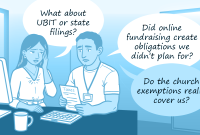Commandments: Law and Religion Blog

Learn the key tax and charitable solicitation filing requirements for nonprofits, including IRS Form 990 obligations and state registration rules for fundraising compliance.

Is saying “Merry Christmas” really controversial? This article examines the “War on Christmas,” its cultural roots, and what employment law actually allows when it comes to holiday greetings, religious speech, and accommodations at work.

This article addresses the common sources of internal church disputes and discusses how churches, ministers, denominations, and other players can identify potential areas of controversy, prevent litigation, and help ensure favorable outcomes if litigation does arise. First, we discuss the concept of church polity as a framework for understanding issues associated with litigation. Next we cover how the governing documents of a church are often critical to both creating and resolving legal disputes. Third, we discuss church litigation resulting from church property disputes and how to prevent and prepare for such controversies. Fourth, we focus on avoiding legal trouble related to defamation and other claims resulting from church discipline. Fifth, we discuss constitutional principles that restrict courts from deciding certain church disputes. Finally, we explore practical steps that church leaders can take to prevent conflicts and keep them out of court.

This article discusses which organizations and activities can qualify for tax exemption and what to consider before starting a nonprofit. Next, it covers selecting your organization’s initial directors and officers and drawing up your organization’s governance documents. Third, it examines the different categories of nonprofit organizations that the IRS recognizes as tax-exempt under Section 501(c)(3). Fourth, it looks at restrictions on private inurement and political activities and how to avoid getting into trouble with the IRS on those issues. Finally, it examines the process of applying for 501(c)(3) status and how to maintain that status going forward.

In many ways, AI promises to improve our world. In others, it brings new risks and threats. Typically, when Americans think “Threats from AI,” we think of science fiction scenarios involving rogue AIs and exploitive mega-corporations. But evil robots and syndicates aren’t the only ones able to exploit AI: child predators can too.

What does mandated training mean for Christians at work? We share a list of states with mandated workplace training related to sexual misconduct, as well as ask the question: how can churches go above and beyond?

The post discusses a recent Title IX sex discrimination lawsuit and examines whether, in practice, this interpretation betrays the law and actually encourages unfair treatment on the basis of sex.

A multi-chapter resource about a recent Fifth Circuit ruling holds there are protections and exemptions for religious employers regarding the sex discrimination provisions of Title VII of the Civil Rights Act of 1964.

This review of the book "When Narcissism Comes to Church," by Chuck DeGroat, discusses how leaders can reflect on narcissistic tendencies both within themselves and their congregation as a whole, and provides hope for healing.

Congress passed the Respect for Marriage Act in 2022. This post discusses the legal context of this legislation, what it does and does not do, and its implications for faith–based organizations.
